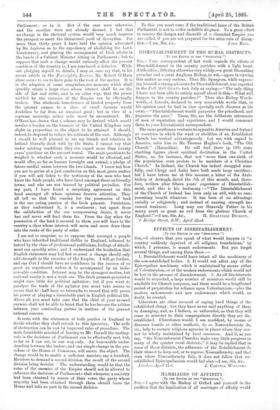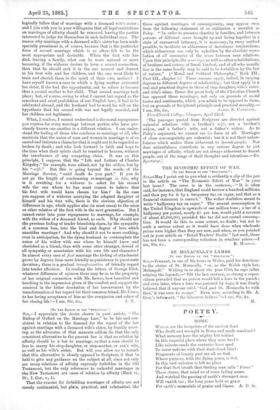MARRIAGES OF AFFINITY.
[To THE EDITOR 07 THE "SPECTATOR?'] SIR,—I agree with the Bishop of Oxford and yourself in the position that the legalisation of all marriages of affinity would
Logically follow that of marriage with a deceased wife's sister ; and I join with you in your willingness that all legal restrictions on marriages of affinity should be removed, leaving the parties interested to judge for themselves in each individual case. The reason why marriage with a deceased wife's sister has been made specially prominent is, of course, because that is the particular form of second marriage which is so oftenfelt to be the most appropriate and desirable. When the first wife has died, leaving a family, what can be more natural or more becoming, if the widower desires to form a second connection, than that he should seek it in the one nearest and dearest to his first wife and her children, and the one most likely to train and cherish them in the spirit of their own mother? I have myself known a case in which a dying mother entreated her sister, if she had the opportunity, not to refuse to become thus a second mother to her child. That second marriage took place; but, of course, owing to what I cannot but regard as the senseless and cruel prohibition of our English laws, it had to be celebrated abroad, and the husband had to word his will on the hypothesis that his second wife was not legally married, and her children not legitimate.
What, I confess, I cannot understand is the moral repugnance you express for every marriage between parties who have previously known one another in a different relation. I can understand the feeling of those who condemn re-marriage at all, who maintain that the union of man and woman in marriage is of so sacred and intimate a character that it ought not to be regarded as broken by death ; and who look forward in faith and hope to the time when their spirits shall be reunited in heaven, without the interference of any competing claim. It was on this principle, I suppose, that the "Life and Letters of Charles Kingsley," for example, were edited, not by his widow, but by his "wife." But this is going beyond the words of the Marriage Service, "until death do you part." If you do not go the length of condemning re-marriage in lobo, why is it revolting for a widower to select for his second wife the one whom he has most reason to believe that his first wife would have chosen for him ? In the case you suppose of a widower marrying the adopted daughter of 'himself and his first wife, there is the obvious objection of difference in age, which applies also (in most cases) to the niece or other relative of the first wife in the next generation. But I -cannot enter into your repugnance to marriage, for example, with the widow of a deceased friend, as such. Why should not the previous feeling of tender friendship ripen, by the sympathy .of a common loss, into the kind and degree of love which sanctifies marriage ? And why should it not be more soothing, -even in anticipation, for the dying husband to contemplate the union of his widow with one whom he himself knew and cherished as a friend, than with some utter stranger, devoid of all sympathy. or association with his own life and character ? In almost every case of first marriage the feeling of attachment grows by degrees from mere friendly acquaintance to passionate devotion ; there is a gradual transformation of friendly regard into tender affection. In reading the letters of George Eliot, whatever difference of opinion there may be as to the propriety of her original connection with Mr. Lewes, how beautiful and touching is the impression given of the comfort and support she received in the bitter desolation of her bereavement by the transformation of her regard for their common friend, Mr. Cross, to her loving acceptance of him as the companion and solace of her closing life !—I am, Sir, &c., J. R.
Fro THE EDITOR OF TIIE " SPECTATOR...1
S1R,—I appreciate the desire shown in your article, "The Bishop of Oxford on the Marriage Law," to be fair and consistent in relation to the demand for the repeal of the law against marriage with a deceased wife's sister, by frankly avowing, as the advocates of that measure seldom do, that the only -consistent alternative to the present law is that no relation by affinity should be a bar to marriage, so that a man should be free to marry his step-daughter, or step-mother, or son's wife, as well as his wife's sister. But will you allow me to remark that this alternative is clearly opposed to Scripture, if that be held to give any guidance on the subject at all, since not only are many relations of affinity expressly forbidden in the Old Testament, but the only references to unlawful marriages in the New Testament are cases of relation by affinity (Mark vi., !8; I. Cor., v., 1).
That the reasons for forbidding marriages of affinity are not merely sentimental, but plain, practical, and substantial, like those against marriages of consanguinity, may appear even from the following statement of so utilitarian a moralist as Paley. "In order to preserve chastity in families, and between persons of different sexes brought up and living together in a state of unreserved intimacy, it is necessary, by every method possible, to inculcate an abhorrence of incestuous conjunctions, which abhorrence can only be upholden by the absolute reprobation of all commerce of the sexes between near relations. Upon this principle, the marriage, as well as other cohabitations, of brothers and sisters, of lineal kindred, and of all who usually live in the same family, may be said to be forbidden by the law of nature." (" Moral and Political Philosophy," Book III., Part III., chapter 5.) These reasons apply, indeed, in varying degrees to different degrees of relationship ; but they apply in a real and practical degree to those of step-daughter, wife's sister, and wife's niece. Hence the great body of the Christian Church has opposed these marriages, not only on grounds of moral tastes and sentiments, which you admit to be opposed to them, but on grounds of Scriptural principle and practical morality.— I am, Sir, &c., JA3IES S. CANDLISH. Free-Church College, Glasgow, April Ilad.
[The passages quoted from Scripture are directed against unlawful relations with a brother's wife, not a brother's widow, and a father's wife, not a father's widow. As to Paley's argument, we cannot see its force at all. Marriages of close consanguinity are unlawful; but it is not their unlawfulness which makes them abhorrent to decent people. Nor does unlawfulness contribute in any serious degree to put marriages of affinity, which are not always abhorrent to decent people, out of the range of their thoughts and intentions.—En. Spectator.]



































 Previous page
Previous page